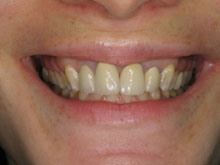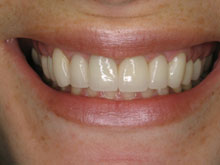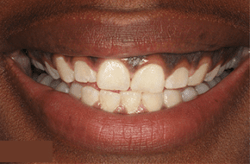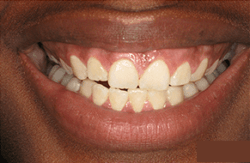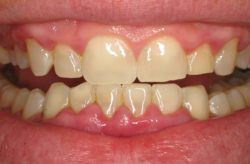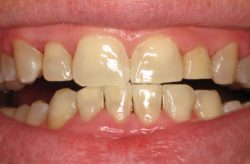Signs & Symptoms of Periodontal Disease
Periodontal (gum) disease progression is usually slow and can go unnoticed for months, even years. By the time patients are aware that something is wrong, (i.e. pain, loose teeth) the infection has most often progressed significantly. You can best prevent periodontal disease or catch it in its early stages late by visiting your dentist every six months for routine cleanings and checkups.
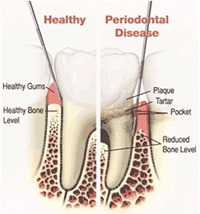
Signs And Symptoms Of Periodontal Disease
Persistently swollen, red or bleeding gums, tooth sensitivity, and bad breath are among the warning signs of periodontal (gum) disease.
Periodontal disease is often silent. In other words, symptoms may not appear until an advanced stage of the disease has been reached. However, warning signs of periodontal disease include the following:
- Bleeding gums. Your gums tend to bleed easily when suffering with periodontal disease. Bleeding gums can result from brushing, flossing, or eating hard foods.
- Red, swollen, or tender gums. Inflammation of the gums is the most common and visible sign of periodontal disease.
- Receding gum line. The gum tissue may begin to recede, eventually exposing the tooth root which can lead to further complications.
- Loose teeth or teeth that have shifted. When periodontal disease leads to bone loss, teeth become loose and my eventually fall out.
- Sensitivity. If there is gum recession, the tooth root is exposed which can lead to sensitivity.
- Persistent bad breath. The plaque and toxins released by the bacteria in our mouth cause bad breath.
What Are The Causes Of Periodontal Disease?
Periodontal disease is typically caused by the bacteria found in dental plaque. Plaque is known as the sticky substance that constantly forms on the surface of our teeth from the food and beverages we consume. When you do not practice proper oral hygiene, the bacteria will manifest and build up on your teeth. Bad oral hygiene can cause the following to occur:
- If the plaque is not removed, the plaque will deposit a mineral known as tartar. Tartar encourages more more bacterial growth to grow towards the root of the tooth.
- In an effort to eliminate the bacteria, the immune systems response is to release substances that inflame and damage the gums.
- Overtime, the attachment between the gums and tooth will be compromised and pockets will form between the gums and the root.
- Harmful bacteria will then manifest deep in the pockets. The bacteria releases toxins that harm the gums, tooth, and supporting bone.
There are also several factors that increases the risk of periodontal disease. The biggest risk factor of periodontal disease is smoking. The toxins and chemicals released into the mouth from smoking negatively affect the gums significantly. Other risk factors include:
- Genetics
- Type 2 diabetes
- Obesity
- Poor nutrition, specifically vitamin C deficiency
- Certain medications that reduce the production of saliva in the mouth
The most effective way to prevent periodontal disease is by maintaining good oral hygiene and by visiting the dentist regularly. Dental cleanings every six months are also important when it comes to the prevention of periodontal disease. They serve to maintain your oral health, as well as to remove the plaque and bacteria that a toothbrush cannot reach. For a complimentary periodontal evaluation, give us a call or request an appointment online!

